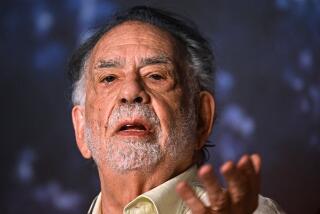Sound at Center of ‘Conversation’
In a movie with a title such as “The Conversation,” you’d expect sound to play an important role. But Francis Ford Coppola does something extraordinary: Sound becomes as complex and revealing as the movie’s central character.
Harry Caul (Gene Hackman in one of his smartest, coolest performances) is a surveillance pro hired to spy on a seemingly innocent young couple (Cindy Williams and Frederic Forrest). Harry is a mastermind when it comes to sonics--with his elaborate devices, he can pick up the most intimate conversation. The recording he makes of the pair suggests that a crime soon may occur.
But as he studies the tape and digs further into the people who hired him, Harry begins to worry. Is the couple planning a murder, or is he providing the means to set up their deaths? Harry is haunted by the possibilities and the moral questions they generate.
The film, being shown tonight as part of Cal State Fullerton’s “American Cinema in the 1970s” series, is one of Coppola’s greats, up there with the first two “Godfathers” and “Apocalypse Now.” Like his hero Orson Welles, Coppola was charged by the opportunities that film presents. Welles used the camera to give new spins to scene development; in “The Conversation,” Coppola used sound for plot development, mood and metaphor.
With the help of editor Walter Murch, he gave sound an identity, and layered the picture’s key scenes with it. In the opening passage, as Harry and his jumpy assistant (John Cazale) zero in on the couple, the background street noise that mingles with the tricky dialogue is linked to surprisingly suspenseful imagery.
The result is a sense of paranoia that escalates as the film goes on. Harry listens to the tape over and over again (it’s an obsession, like his confessions in church), and each time the recording becomes both more telling and more eerie. Symbolically, the volume grows, until finally Harry breaks down.
On one level, “The Conversation” (which Coppola wrote as well as directed) works as a clever mystery with beguiling cul-de-sacs and a shell-game of an ending. But within this framework is a nervous ‘70s commentary reflecting on fears of loss of privacy and misuse of technology that should still worry us today.
Indeed, the movie stays with you, like a snatch of conversation barely overheard but lingering, strange and suspicious.
More to Read
Only good movies
Get the Indie Focus newsletter, Mark Olsen's weekly guide to the world of cinema.
You may occasionally receive promotional content from the Los Angeles Times.










